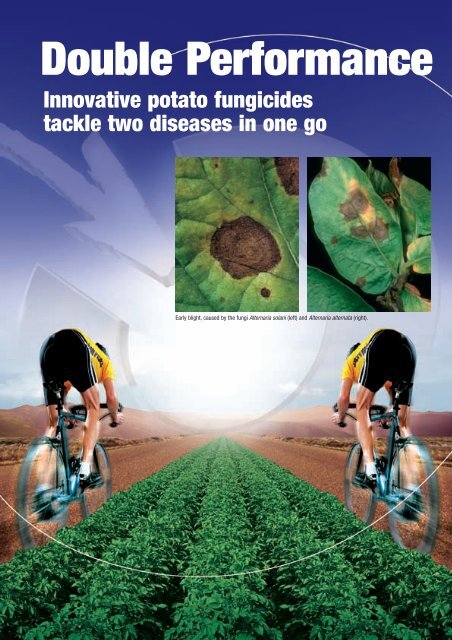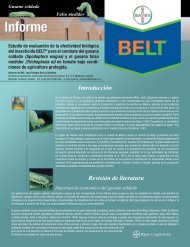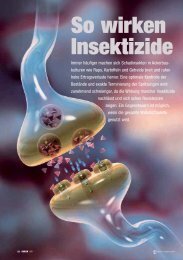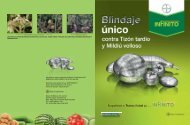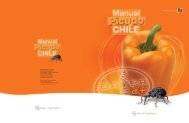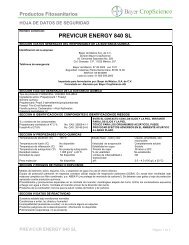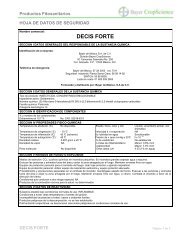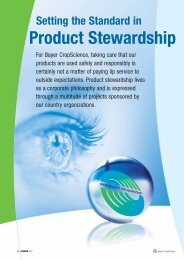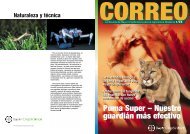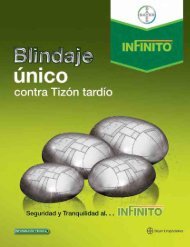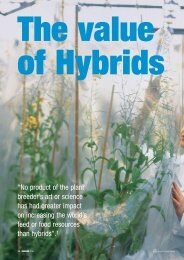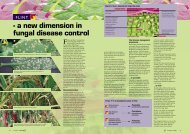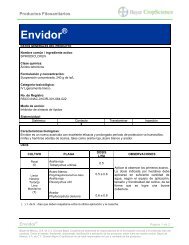Download: ( 402 KB pdf) - Bayer CropScience Mexico
Download: ( 402 KB pdf) - Bayer CropScience Mexico
Download: ( 402 KB pdf) - Bayer CropScience Mexico
You also want an ePaper? Increase the reach of your titles
YUMPU automatically turns print PDFs into web optimized ePapers that Google loves.
Double PerformanceInnovative potato fungicidestackle two diseases in one goEarly blight, caused by the fungi Alternaria solani (left) and Alternaria alternata (right).
While late blight (Phytophthora infestans)remains the most important potatodisease world-wide, early blight (Alternariaspp.) is gaining ground. Once mainly aproblem in warmer climates early blightnowadays even threatens potato farmers inNorthwest Europe. In this region <strong>Bayer</strong><strong>CropScience</strong> targets both fungal diseaseswith one innovative active substance:fenamidone, branded under the name ofFenomen ® . The Fenomen based potatoLate blight (Phytophthora infestans)fungicides Sereno ® (fenamidone plus mancozeb)and Consento ® (fenamidone andpropamocarb hydrochloride) control bothlate and early blight.Early blight, caused by the fungiAlternaria solani and Alternaria alternata,provokes premature defoliation in potatoplants which hampers a vigorous growth oftubers, resulting in significant yield losses.First symptoms of Alternaria spp. usuallycan be observed on the older, lower leaves,then progressing up the plant. Characteristicsymptoms of Alternaria solani are darkbrown or black lesions on leaves, dry andpapery in texture. Enlarging lesions formconcentric rings, producing a “target spot”effect. Leaf tissue adjacent to the lesionstypically yellows. Alternaria alternatacauses small spots which can be mistakenfor an early infection of A. solani. Thefungi can only be distinguished under themicroscope by their different shape ofconidia.The fungi overwinter as mycelium orconidia in plant debris, soil, infected tubersor on other hosts of the plant family astomato or eggplant. Spores are spread bywind and need moisture to infect theleaves. Heavy dews, frequent rains, overheadirrigation and high humidity favordisease development, as do temperaturesover 20° Celsius. Only one week afterinfection first symptoms appear on thepotato leaves, in general shortly after flowering.Early grown cultivars with a softpotato skin are particularly susceptible toAlternaria spp. A rich nutrition, especiallywith nitrogen, decreases host susceptibility.In some parts of the world, early blighthas been a serious problem for many years.But only recently, considerable Alternariainfestation was reported in France, Germanyand the Netherlands. Potato research suggeststhat climate change, reduced fertilizerinput and a shift to fungicides withoutAlternaria efficacy have boosted proliferationof the disease.As Phytophthora infestans, the causalagent of late blight, poses the most seriousthreat to potatoes, fungicide developmenthas focused on controlling this disease. Forearly blight control in potato, specificfungicides have been developed and registered.In spray programs these specificearly blight products need to be combinedwith late blight fungicides, either as additionalsprays or as tank-mix partners. Thiscomplicates disease control and increasescosts for the farmer.Sereno and Consento, the new potatofungicides of <strong>Bayer</strong> <strong>CropScience</strong>, sort outthese problems by controlling both late andearly blight. The active substance fenamidonebelongs to the imidazoline class ofchemicals. “Fenamidone is a great jumpahead in potato blight control”, says KoenVan den Eynde, Product Manager at <strong>Bayer</strong><strong>CropScience</strong>. “The double performance ofthe substance, working against Phytophthoraand Alternaria with one single product,makes up its particular power”, theProduct Manager explains.Field trials not only demonstrated theexcellence of Sereno and Consento in lateblight control but also its fungicidal effecton Alternaria spp. Both products outperformspecific early blight fungicides whenit comes to control the two species, A.solani and A. alternata, applied at 150grams Fenomen per hectare. Sereno andConsento primarily show preventive activity.So in case of infection risk, techniciansrecommend a block treatment of three consecutiveapplications, alternating withanother potato fungicide.Once applied, fenamidone is absorbedby the plant and penetrates the whole leafso that it cannot be washed off by rain.Fenamidone may stop the fungal disease atall pathogen growth stages: It inhibitssporulation and direct germination of sporangia,stops the release and mobility ofzoospores and prevents encystment as wellas cyst germination on the potato leaves.The inhibition of both direct and indirectgermination means that the productequally performs independent of the temperature.“Our lab trials prove that fenamidoneis a strong sporicide and that it alsohas high activity on the sporangia viabilitywhich is necessary for a good tuber quality,”Van den Eynde elucidates. So it isFenomen which makes up the power ofSereno and Consento.Mixing the substance with mancozeb orpropamocarb, however, is part of a resistancemanagement strategy. “How potentFenomen in its immediate effect mightever be – it should be combined with activesubstances which show a different mode ofaction and a low resistance risk”, Van denEynde recommends.Consento is a mancozeb-free fungicidewith a very favorable toxicological and ecotoxicologicalprofile. Products from treatedcrops meet the increasing quality requirementsof the food-processing industry.Up to date <strong>Bayer</strong> <strong>CropScience</strong> haslaunched the new potato fungicide Fenomenin almost 60 countries. “With Sereno andConsento we are meeting a brisk demand”,the Product Manager says and has only oneexplanation: “Growers get high value fortheir money: a high level of late blight controlplus the superior Alternaria control.Sereno and Consento tackle two diseasesin one go, that is what makes them outstandingand innovative.” ■1/06 COURIER 19


